
What are digestive enzymes?
When you eat, your digestive system—especially your stomach and intestines—get to work gleaning protein, vitamins, fats, and carbs from your food. These nutrients enter your bloodstream, and your body puts them to use for energy, growth, and repair.
But none of this could happen without digestive enzymes; according to the experts at Harvard Medical School, the three main types are:
- Protease: Pulls proteins from food and converts them into amino acids and small peptides to build and repair.
- Amylase: Breaks down carbohydrates into simple sugars for energy.
- Lipase: Breaks down fats into fatty acids.
Other enzymes, lactase, maltase, and sucrase, are each responsible for breaking down different types of sugar. Lactase breaks down the sugar found in dairy. Maltase breaks down maltose, sugars in malted sugar. Sucrase breaks down sucrose, which comes from sugar cane or beet syrup.
Although your body produces the enzymes, you can give your digestive system a hand by eating foods that are naturally high in these digestive helpers.
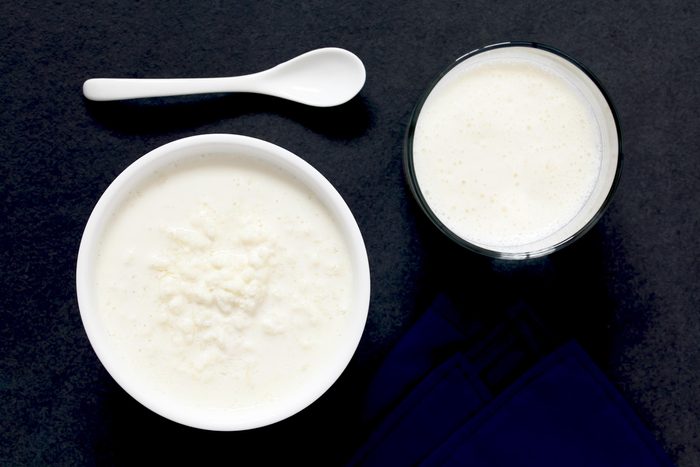
Kefir
In the dairy section, look for this fermented milk beverage that’s thick and creamy. While studies suggest it can deliver a variety of health benefits, kefir is primarily sought out for its good-gut health benefits, including probiotics and digestive enzymes. In kefir, digestive enzymes like lipase, lactase, and protease are created when bacteria in the beverage develop. As the bacteria grow and multiply, the number of nutrients and enzymes expand, too.
Despite being a milk beverage, kefir may be safe for people with lactose intolerance (their body cannot make the lactase enzyme). Research suggests, however, that kefir might improve digestion of lactose. To make your own, check out our step-by-step recipe.

Honey
“Honey is a superfood when it comes to enzymes since it contains amylase, protease, diastase, and invertase,” says Miriam Amselem, a holistic nutritionist. Diastase breaks starches into digestible maltose. Invertase breaks sucrose into easy-energy sources glucose and fructose. “Make sure to eat it raw,” Amselem adds. Heated honey has none of the good-for-you has fewer intact enzymes—just remember that raw honey can be dangerous for children under the age of one and pregnant women.
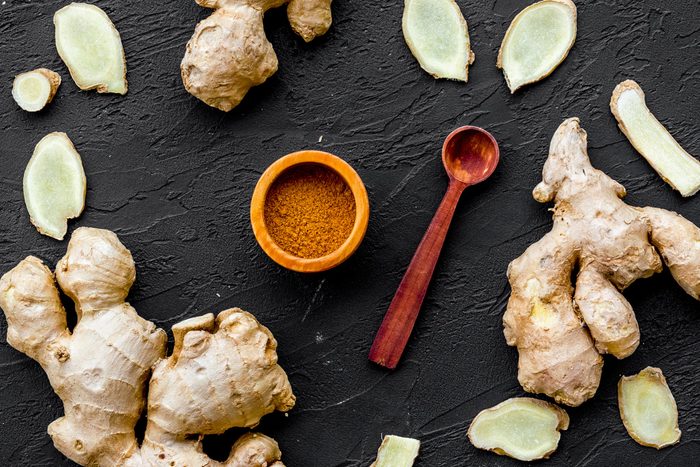
Ginger
Ginger is well-known for its anti-nausea effects, but the root also contains a digestive enzyme called zingibain. It’s a type of protease and breaks down protein in the foods you eat. Ginger is especially good for stimulating a stalled GI tract. Eating or drinking foods with ginger will promote contractions in the muscles that line the digestive organs. The root also happens to be good for your hair and skin.

Miso
Miso is great for so much more than soup. The fermented soybean product is a rich source of digestive enzymes, including lactase, lipase, amylase, and protease. Plus, miso is a good source of probiotics, thanks to the fermentation process. The duo of digestive enzymes and the gut-healthy bacteria is a mighty healthy dose for your digestive system. Indeed, research suggests miso, as well as other fermented foods, may help ease symptoms of digestive problems like irritable bowel syndrome (IBS).
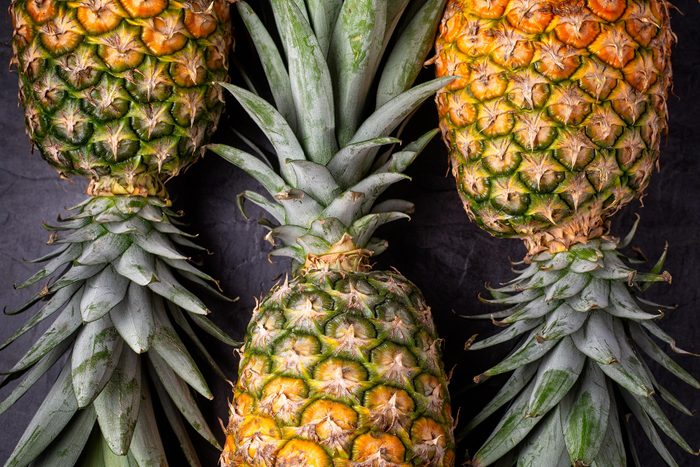
Pineapple
Ever notice how chicken and pork are often paired with pineapple? There may be a digestive explanation. “Pineapple contains bromelain, a protease. Eating pineapple alongside protein-rich foods supports digestion of the meal, says Erica Ingraham, MS, RDN. Learn how pineapple helps relieve indigestion.
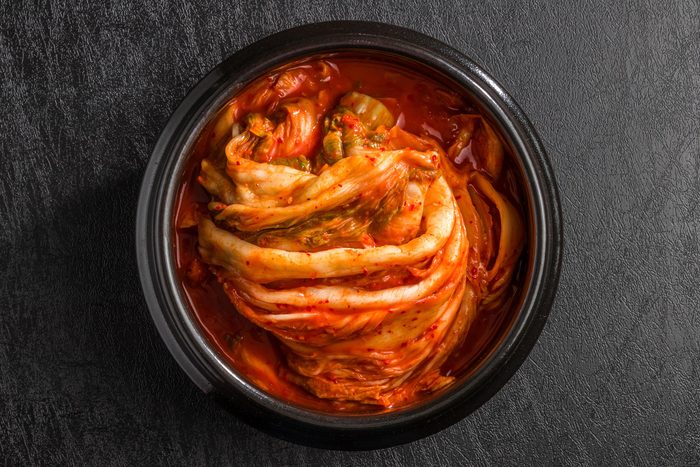
Kimchi
Like miso, kimchi is a fermented food—starting with cabbage, in this case. The fermentation introduces a lot of healthy bacteria to the traditional Korean food and the bacteria produce digestive enzymes that are good for your GI tract and your body overall.
Kimchi is rich in protease, lipase, and amylase enzymes. Research suggests kimchi is good for a few other health conditions, including high cholesterol. One study found that the fermented cabbage food lowered LDL cholesterol (the bad kind).
Eat your kimchi without heating it first to get the best benefits for your GI tract: “Raw food, meaning food that has not been heated above 116 degrees Fahrenheit, provides the enzymes needed for complete digestion and breakdown of nutrients,” says Robyn Openshaw, author, educator, lecturer, and founder of Green Smoothie Girl. Want to make your own kimchi? Try our low-cal Mexican and Korean fusion recipe.

Mango
“Mango helps break down carbs into glucose and maltose with the digestive enzyme amylase,” Amselem says. Mango enzyme activity actually increases as the mango ripens. This also explains why the fruit gets sweeter with age: The enzymes break down the fruit’s starches into sugars.
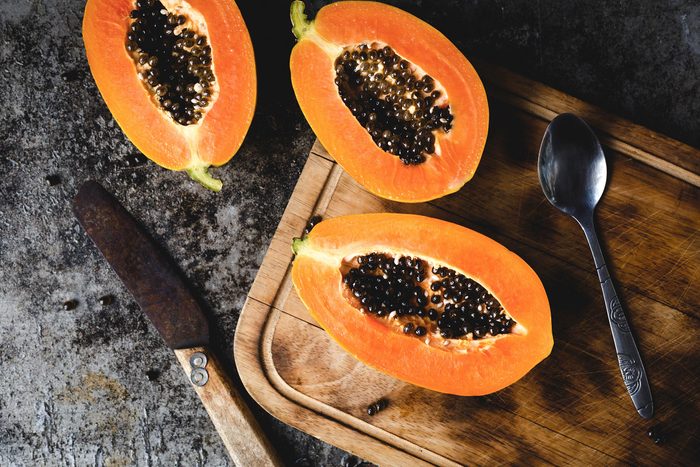
Papaya
Like pineapple, the tropical papaya fruit is also a good source of the digestive enzyme protease. This enzyme breaks down protein into amino acids and peptides that your body can more easily use. But it’s not the only digestive enzyme in this fruit. “Papaya also contains papain, which breaks down protein into amino acids,” Amselem says. As with other fruits and foods, it’s best to eat papaya raw so you get the most benefit from the enzymes.
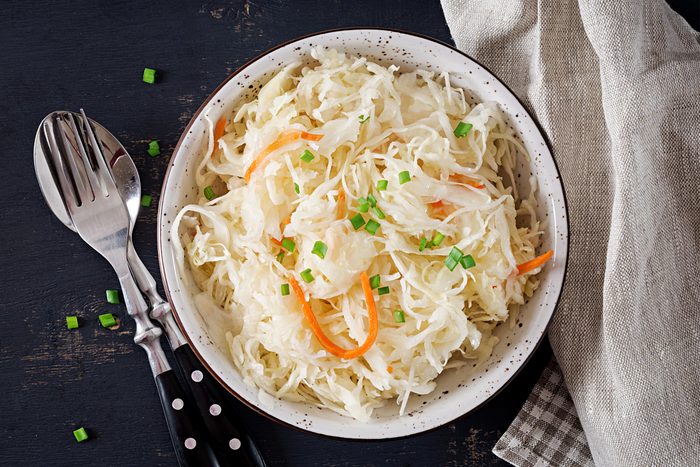
Sauerkraut
Like kimchi, this fermented cabbage food is rich with digestive enzymes. “As a bonus, sauerkraut’s probiotic effect keeps the gut and immune system strong,” Ingraham says. Just be sure to buy sauerkraut that is raw and not pasteurized. Heating sauerkraut for pasteurization will kill the good bacteria and deactivate the enzymes you want.
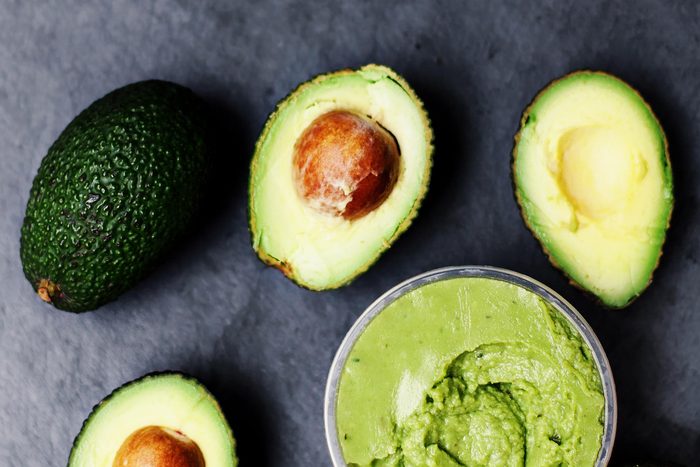
Avocado
Here’s another great reason to indulge in avocado toast: Avocados are a good source of the digestive enzyme lipase. Lipase helps break down fat in foods into molecules that are easier for your digestive system to absorb. If you don’t count yourself an avocado fan, don’t worry. Lipase is actually made naturally by your pancreas, and most people do not need additional supplements for this enzyme. However, if you find fatty foods make your stomach uneasy, a lipase supplement might make digestion easier and give your GI tract a helping hand in the break-down process. Research shows it may also help prevent the uncomfortable “full” feeling after a meal.
More of a yogurt fan for breakfast? Our creamy Avocado Parfait is perfection.

Apricot
Apricots contain invertase, a digestive enzyme that helps break down the stone fruit’s sugar and deliver quick energy to your body’s cells. What’s more, research suggests the fruit may also ease gastrointestinal issues, like constipation, acid reflux, and indigestion.

Banana
If you eat a daily banana for the potassium, good news—you’re serving yourself a good dose of digestive enzymes, too. This classic is a good source of two digestive enzymes—amylases and glucosidases. Both of these enzymes break down carbohydrates in the food you eat and turn them into simple sugars the body can more easily absorb. You can see these enzymes at work when green, unripe bananas turn sweeter as they age—that’s the action of the enzymes. Bananas have plenty of health benefits and are always in season, so getting this fruit in your diet will be easy.
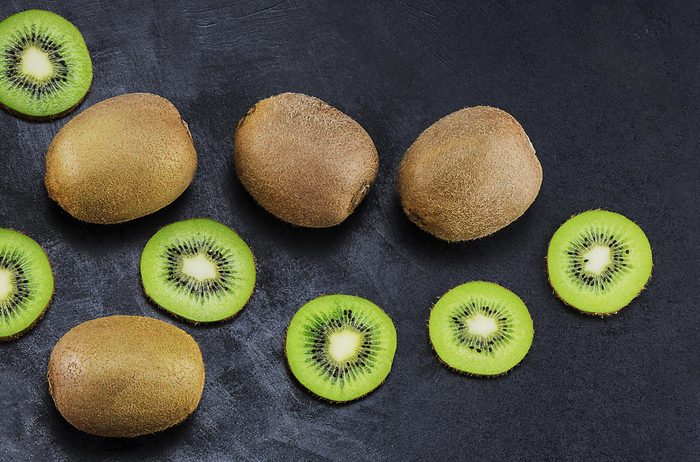
Kiwi
“Kiwi is another excellent fruit that contains the digestive enzyme actinidain. It helps digest proteins,” Amselem says. “Because it eases digestion, it helps with constipation and bloating, too.” One study found that the enzyme may help your GI tract digest meat more quickly and break it down into its usable parts. That may be what actinidain is commonly used as a meat tenderizer by food companies, too. Now, check out the “healthy” foods nutritionists never eat.
